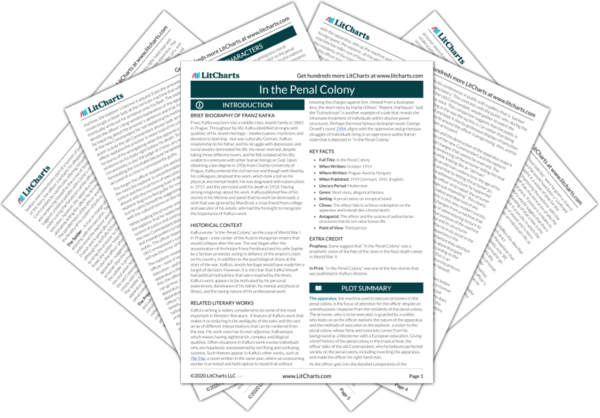Tradition vs. Progress
“In the Penal Colony” is a story of the planned demonstration of an execution using a machine called the apparatus by the military officer of a penal colony on a foreign island. The officer, well acquainted with the apparatus, sets up the machine and explains its use to a foreign guest, the explorer, all the while detailing how the machine has fallen out of favor with the new Commandant and the residents of…
read analysis of Tradition vs. ProgressPower and Justice
“In the Penal Colony” explores what constitutes due and fair process in society. Kafka centers the plot on the planned execution of a prisoner who, instead of receiving a trial, has been sentenced to death by a high-ranking officer who automatically assumes that every man who is charged with a crime is guilty. The crime of the prisoner is one of disrespecting authority, further centering the importance of power structures in this world. What’s more…
read analysis of Power and JusticeReligion
Religious fervor is an explicit undercurrent throughout “In the Penal Colony.” The old Commandant, who used to run the penal colony and is rumored to someday return, is reminiscent of an authoritarian god, while the officer acts as his lone remaining disciple. So devoted is the officer to the way of life embodied by the old Commandant that he follows his savior into death, sacrificing himself to his beloved apparatus in a sort of…
read analysis of Religion
Culture and Otherness
Though it is unclear where the central officer in “In the Penal Colony” is from, the explorer is clearly distinguished as a Westerner who is conditioned with European ways of thought. The explorer is the onlooker of a planned execution of a prisoner that he quickly learns is unaware of his crimes and did not receive a trial that included any sort of defense. The explorer is highly regarded by the residents of the penal…
read analysis of Culture and Otherness






